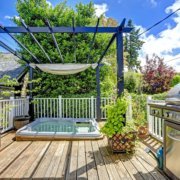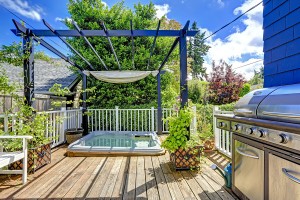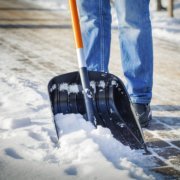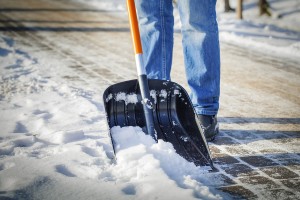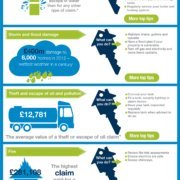It’s time to consider how well you illuminate the way to your holiday letting property with outside lighting. With British Summer Time at an end for another year the mornings and nights will soon be much darker. So if you’re welcoming guests during the winter months, ask yourself how well-lit is the exterior of your holiday home and the paths that lead to it? 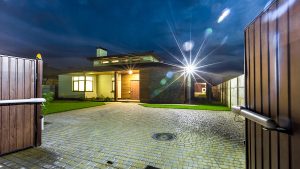
Reducing the risks of slips, trips and falls with outside lighting
It’s important that all paths, steps and approaches to the entrance to your holiday home are illuminated sufficiently. Carefully positioning outside lighting will reduce the risks of slips, trips and falls.
During the winter months’ guests may not only have to deal with arriving or departing whilst it’s dark, they may also have to endure the cold, ice or rain that often accompanies the great British winter.
Slippery surfaces can become real hazards once the sun has gone down, and if you combine this with the fact that your guests won’t be familiar with the layout of your cottage and the approaches that lead to it, it further emphasises the importance of lighting these clearly for them to follow.
Should a guest trip and fall when approaching your holiday home at night, any injury claim will be impossible to defend if your paths and steps are not well lit.
Making things easy – lighting your key safe
The majority of holiday homes will have a key safe. They provide your guests convenient access no matter what time they’re arriving. You should ideally have a light in this area so guests are able to easily see the key code. There’s nothing worse than trying to find some sort of light, whether via a smart phone or a torch they keep in the car. Especially when all they want to do is get in, start their holiday and relax after a long drive.
Making sure they’re at the right place
Lighting the name or number of your property will give your guests confidence they’ve arrived at the right place. With our ever extending reliance on sat-navs, this can be an important feature if they’re arriving at night when they can’t fully see the exterior of the cottage. An added bonus if your cottage is in the countryside when a postcode may cover several different roads.
Options for reducing electricity bills on lighting
Whilst LED lights have become increasingly common within the interior and exterior of holiday homes to reduce potential energy bills (research has indicated they can save you up to £200 per year in an average household by being 10 times more efficient than their candescent counterparts), there are a number of solutions that could cut the costs of external lighting on your holiday home.
If you’re looking at the pathways to your property have you consider solar powered lights. These can be quick and easy to install, cost effective to buy and should still emit light in the darkest days of winter. However be sure to purchase good quality solar lights that will stand up to the job.
Looking to light that key safe? Consider motion censored lighting. Whilst there is a cost, it should soon pay for itself. Lighting triggered by motion can also scare off potential intruders looking to gain entry to your holiday home.
Maintaining your outside lighting
Ensure that all of your bulbs and outside lighting are regularly checked. This may be by you, your housekeeper, caretaker or whomever is responsible for the continued upkeep of your property. Whilst it’s only a small job, a faulty bulb can end up on a busy to-do list. Therefore ensure that as soon as there is an issue it is quickly resolved. This will make life easier for your guests and make their stay safer. It may even save you a costly holiday home insurance liability claim.
Boshers offer specialist holiday home and property insurance to holiday cottage owners across the country. For more information on our policies have a look around Boshers website. For a quote or to ask any question please give our team a call on 01237 429444.

